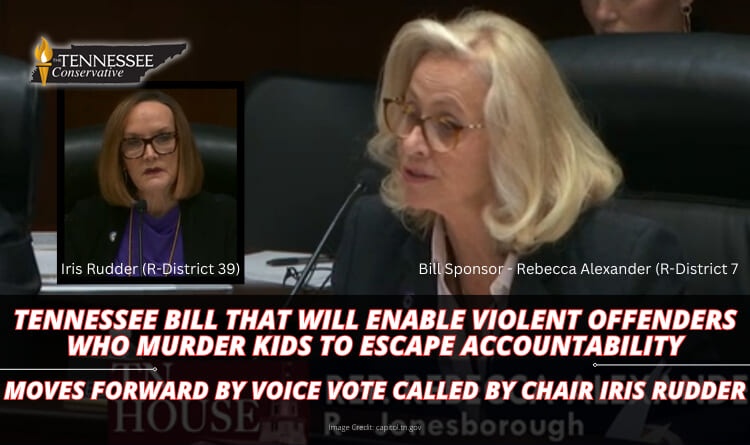Image Credit: capitol.tn.gov
The Tennessee Conservative [By Kelly M. Jackson] –
This week a bill that will keep the autopsy reports of children killed at the hands of violent crime offenders from being public record moved through the Tennessee House Public Service Subcommittee with relative ease by voice vote, led by Chair Iris Rudder.
For the vote in the Public Service Subcommittee, Chair Iris Rudder (R-Winchester-District 39) chose to use a voice vote to hide the voting records of subcommittee members from public scrutiny. We can only assume Chair Rudder supports HB1695 and is responsible for its passage. Chair Rudder could have used a transparent roll call vote but opted for a voice vote to shield subcommittee members and herself from accountability.
The voice vote was recorded solely as “Ayes Prevail”.
According to a statement made by Representative Jody Barrett (R-Dickson-District 69) on the Mill Creek View Tennessee Podcast, all a legislator has to do in order to have their voice vote recorded is give a thumbs up or a thumbs down to the clerk. This means that it is very easy for legislators to put their vote on the record and create transparency with their constituents if they choose to.
However, according to the General Assembly website and associate video of the Public Service Subcommittee meeting, no member requested to have their votes counted.
The House Public Service Subcommittee members include:
Iris Rudder (R) – Chair – District 39
Rebecca K. Alexander (R) – District 7
Vincent Dixie (D) – District 54
Rick Eldridge (R) – District 10
Curtis Johnson (R) – District 68
Kelly Keisling (R) – District 38
Dennis Powers (R) – District 36
Even though a voice vote was taken, in watching/listening to the video, no NAYS were audible.
House Bill 1695 (HB1695), carried in the House by Representative Rebecca Alexander (R-D7-Jonesborough) states: “Autopsies – As introduced, specifies that reports of county medical examiners and autopsy reports of victims of violent crime who are minors are not public documents; allows a parent or legal guardian of a minor victim of a violent crime to consent to the release of the report of the county medical examiner or autopsy report of the minor victim if the parent or legal guardian is not a suspect in the circumstances of the minor’s death. – Amends TCA Title 10, Chapter 7; Title 38; Title 39 and Title 40.”
As the law currently reads, all reports of the county medical examiners, toxicological reports, and autopsy reports are public documents, without exception.
The bill, if made law, will add a caveat to any of those documents that pertain to minors who are the victims of violent crimes and will exclude them from public consumption with two new exceptions.
The exceptions enumerated in the bill are:
1) The minor’s parent or legal guardian is not a suspect in the circumstances of the minor’s death and the parent or legal guardian consents to the release; or
2) A court orders the release of the report upon a showing of good cause.
In other words, these documents will always be excluded from public access so long as the suspected responsible party for the death is not the parent or legal guardian of the child, and the parents or legal guardians’ consent to the records being made public.
When presenting the bill before the committee, Alexander explained that the bill was being revived from having been heard and passed in the state House during special session, but that at that time, the senate did not choose to take it up.
Alexander took a moment to explain that there was an amendment added on behalf of DCS that would enable them to have free and full access to the autopsy reports, should they be pulled into a federal investigation and need that access.
Alexander then went on to describe the reasons for the bill, which are to “protect the autopsy reports of minors up until they are 18 so that they are not in the general public viewing”.
Alexander continued, “we have the ability to protect our children while they are alive, we lose that when they’re dead. And for these moms at Covenant, which is where this bill came from, the phone calls we were getting asking to have, having their child’s autopsy report, out in the public was horrendous and it was a nightmare for them. So that’s why we decided that minors need to be protected even in death.”
Also present in the hearing was Deborah Fisher, Executive Director of Tennessee Coalition For Open Government, to speak in opposition of the bill, explaining that such a bill would shield violent perpetrators who have murdered a child, from receiving a just consequence.
Fisher explained in detail how this bill will harm future child victims of violent crime:
“This bill seeks to close information about crime victims. But what it really does is close information about a crime. State law requires an autopsy when a person is killed by another person, or a death is suspicious. Autopsies are public record in most states. They have been public record in Tennessee from the beginning. The information in an autopsy is very important in determining not just how a person died, but who the killer was.”
Fisher continued, “This bill assumes that police and prosecutors always get it right. Every couple of years, a story emerges in which a local journalist has used an autopsy — often working with a frustrated extended family member and not necessarily the parent — to shine line on both mistakes and attempted coverups.“
At that point in her testimony, Fisher included instances where there were child victims, one of a police shooting that attempted to be covered up by the police department in the case.
Another example shared was a closed case that was reopened due to the reporting of a local news anchor, and because the autopsy report was accessible, it led to the conviction of the child’s killer.
As previously reported by The Tennessee Conservative, if a child is killed while a ward of the state, DCS would have to consent to the release of the autopsy.
When their culpability is in question, there is a likelihood that those reports would never even see the light of day, and therefore, there would be no justice for those children.
Fisher also reminded the committee that anyone who needed access to these records who weren’t the guardian or the parent, would have to resort to legal means and go to court to do so – an action that for many would be would be cost prohibitive.
Fisher also acknowledged the families for which this bill was written, stating, “I know there is a desire to ease the grief of the parents of the Covenant children. Those autopsies have already been released under state law. Nothing changes there. This bill deals with autopsies in the future. It won’t protect children, but it may have the very unintended consequence of protecting their killers.” You can see the entirety of her remarks here.
Fisher’s testimony while rational and compelling, seemed to fall on deaf ears, as the entire subcommittee voted to move the bill forward, where it will be heard by the full House State Government Committee at a later date.
Should anyone wish to take action on this bill, and make their opinion known to those who will voting on whether this bill should become law, you can do here at this link.

About the Author: Kelly Jackson is a recent escapee from corporate America, and a California refugee to Tennessee. Christ follower, Wife and Mom of three amazing teenagers. She has a BA in Comm from Point Loma Nazarene University, and has a background in law enforcement and human resources. Since the summer of 2020, she has spent any and all free time in the trenches with local grassroots orgs, including Mom’s for Liberty Williamson County and Tennessee Stands as a core member. Outspoken advocate for parents rights, medical freedom, and individual liberty. Kelly can be reached at kelly@tennesseeconservativenews.com.



